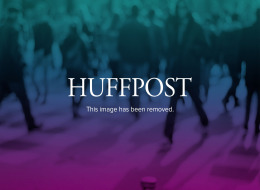Hiring In Weak Economy Allows Companies To Gain On Retreating Competitors
Posted: 08/28/2012 10:07 am Updated: 08/28/2012 10:07 am

Steve Jobs, who rejected conventional wisdom about layoffs while at Apple, launched the iPad despite a weak economy in 2010. (AP Photo/Paul Sakuma)
NEW YORK -- The Bureau of Labor Statistics last week announced that 12.9 million workers were laid off from January 2009 to December 2011. For many companies, the answer to the economic downturn has been brutally simple: cut jobs.
But there are other businesses, even in industries buffeted by the financial crisis, that have bucked the trend, avoiding layoffs. Some are publicly traded household names. Others, like business software company SAS, are privately held and operate with a lower profile. They share a belief that layoffs aren't the only way to help the bottom line during tough times, and that hiring might be wise.
Jeffrey Pfeffer, a Stanford University business school professor, said many companies make a simple mistake when they decide on layoffs as a response to economic stress. "Most companies actually do not have an expense problem," he said. "They have a revenue problem.
"What you need then to ask is, 'If I cut people, if I cut the quality of the products and services I am providing into the marketplace, is this going to solve my revenue problem or is it going to make it worse?'"
Taking that question to heart are companies like Southwest Airlines. Despite the extreme stress that the recession and then rising fuel prices have put on airlines, the Texas-based company has not had any mass layoffs since the recession began in late 2007, according to a state database.
Southwest's record stands in sharp contrast to its competitors, including United Airlines, which recently announced 1,300 layoffs in Houston as part of what one critic called a "corporate temper tantrum." Southwest, meanwhile, has been expanding, acquiring AirTran in 2011 without planned layoffs.
Among business leaders and stock market analysts, there used to be a common belief in what was called "the 7 percent rule," which held that a company's stock would jump that much immediately after the announcement of mass firings. That rule, it turns out, was bogus.
Nevertheless, some investors might have believed that downsizing implied a company was serious about cost-control. But Wayne Cascio, a University of Colorado-Denver business professor, said there is little empirical basis for that belief.
Cascio is still crunching the numbers for the recession and its aftermath. But "historically," he said, "we have done this research and we looked at the S&P 500 over a 20-year period, and what we found was companies that all they did was lay off people, and they didn't change anything else ... they never outperformed their competitors."
There may even be a good case for hiring during a downturn.
"The best time to gain competitive advantage on your competition is when they are retreating," said Pfeffer.
Steve Jobs certainly thought so. The late Apple CEO launched the iPod during the 2001 recession.
"What I told our company was that we were just going to invest our way through the downturn, that we weren't going to lay off people, that we'd taken a tremendous amount of effort to get them into Apple in the first place -- the last thing we were going to do is lay them off," Jobs told Fortune in 2008. "And we were going to keep funding. In fact we were going to up our R&D budget so that we would be ahead of our competitors when the downturn was over."
Not every company is in as dynamic an industry as Apple. But, pointing to companies that have resorted to serial firings instead of innovation to avoid insolvency, Cascio said they all need to come to a simple realization: "You can't shrink your way into prosperity. You've got to find ways to grow your business."